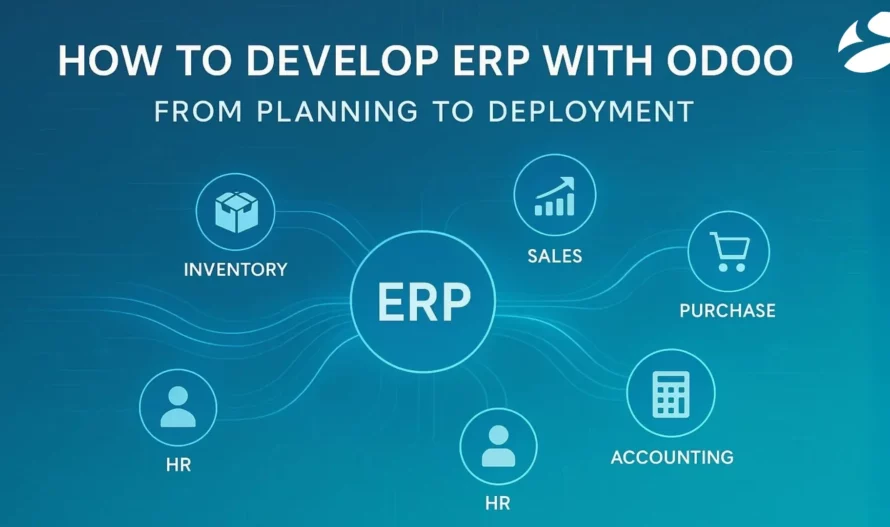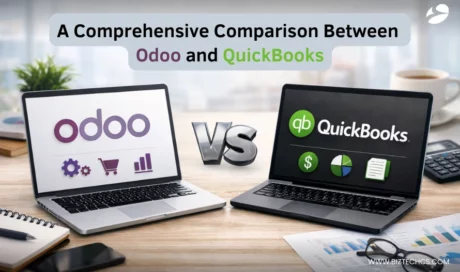800
Full Guide How to Develop ERP with Odoo Latest Updated
5 min read

Imagine running a business while juggling multiple operations management systems. Tracking inventory with one and managing customer relationships with another, while accounts management is on a whole other system. Tiring right?
Now, think about how difficult it would be to coordinate between multiple platforms just to get basic day-to-day tasks done. But that’s the reality of current business processes. It is chaotic, making business management even more difficult.
There is one solution for all this chaos, a proper ERP system. Although there are many ERP platforms available on the market, not all of them fit the requirements for unique business challenges. If you’re looking for a versatile tool that streamlines all your operational complexities with flexible solutions and functionalities, then Odoo is the perfect choice for you.
Want to know why Odoo is the best choice and how exactly one should go about Odoo ERP development? Read on, as this will cover everything from what makes Odoo a better choice to development strategies and processes.
Unlike traditional ERP systems, which often come with massive price tags and rigid structures, Odoo offers a modular approach that’s both flexible and cost-effective. Think of it like LEGO blocks, where you start with what you need and add more pieces as your business grows.
The platform includes over 30 core applications, from sales and CRM to manufacturing and project management. What really sets Odoo ERP development apart is the open-source foundation. This eliminates vendor lock-in and allows businesses to customize their ERP extensively, building custom functionalities without needing to update with feature rollouts.
Do not jump straight into Odoo ERP development. Design a proper plan by mapping out your business processes. This will help you create a custom solution tailored to your business, rather than using a generic solution designed for everyone.
Discuss with your team since those who will use the system regularly will be affected the most. Find out what slows them down every day, where invoices get stuck in approval limbo, and why inventory numbers never seem to match reality. These conversations reveal what your ERP needs to solve for integration success.
Once planning and operational gaps are understood, Odoo integration is straightforward. This is because it offers extensive documentation and has an active community to help beginners. There is a slight learning curve, but it is manageable.
Odoo ERP development becomes significantly easier once you grasp the architecture. The platform employs a three-tier architecture, comprising user-facing components, business logic, and data storage. Nothing groundbreaking here, but it’s clean and makes sense.
The ORM system is genuinely clever. Instead of wrestling with SQL queries, you work with Python objects that represent your database records. Creating a new customer? You do not need to worry about foreign keys and table structures. It keeps code readable and easy to maintain.
Odoo’s inheritance system is also worth mentioning. You can extend current modules without touching core code. This matters more than you might think; it ensures your customizations survive version upgrades without breaking everything.
One benefit of Odoo ERP development is that every module follows a consistent structure, comprising manifest files, Python business logic, XML views, and security definitions. Once you’ve built one or two, the pattern becomes second nature.
Odoo ERP development allows you to build a consistent structure across multiple layers and processes. The pattern sets itself up when repeated twice or thrice. For instance, let’s say you need to track service contracts.
First, you will define your data model by adding contract dates, renewal terms, customer links, and SLA details. Odoo handles the database creation automatically once you define your fields properly. Next, you will design how users interact with this data, like implementing forms for detailed views, lists for browsing, and Kanban boards for visual workflow management.
Finally, Odoo converts rules, such as auto-contract renewal triggers, workflow approvals, etc., into operational methodologies. The framework handles the complexity while you focus on the actual business requirements.
An ERP that doesn’t integrate with your other tools isn’t solving much. Odoo ERP development shines here because the API makes connections straightforward. Payment gateways, shipping carriers, e-commerce platforms, and legacy systems are all accessible through REST or XML-RPC APIs.
Whether you want to sync customer data with your marketing platform or pull order information on your analytics platform, Odoo’s ERP integration allows it all. Additionally, it offers intelligent AI-powered functionalities and operates offline as well.
Odoo’s app store offers a wide range of integrations for businesses to utilize. Additionally, it allows them to customize the system if desired. Extensive customization enables businesses to design a solution that seamlessly integrates with their existing system.
ERP systems connect all the processes, so bugs have real consequences. Odoo includes testing frameworks for both unit tests and complete workflow validation.
Verify if the business rules are actually enforced well. Critical checkpoints, such as expense report approval, inventory calculations, and multiple-user access (and their limits), must be thoroughly tested to avoid any issues down the road.
Performance testing matters especially as data grows. A robust system should be able to scale easily to match the varying business needs. Load testing finds these bottlenecks before your users do. Sometimes it’s adding database indexes, other times it’s moving heavy operations to background processing.
Migrating Odoo ERP development projects into production is most effective with phased rollouts. Start with one department or process, gather feedback, adjust, then expand. Clean your legacy data thoroughly, validate everything, and run systems in parallel during the transition. This helps secure data migration and allows staff to become accustomed to the new system gradually.
Even perfectly developed systems fail if users don’t understand them. Create practical, role-specific materials to help your staff adjust to major changes. Invest in thorough training to further ease the process.
They identify gaps in current systems as they familiarize themselves with the systems, such as workflow streamlining, report assessment, and the elimination of repetitive tasks. To tackle this, build feedback loops that capture these insights and prioritize them realistically.
Document code reviews and system upgrades even though it feels like a tedious process. Doing so streamlines collaborative project management and prevents miscommunication. Proper documentation will be beneficial for future upgrades and management.
While an in-house developer can easily manage Odoo ERP development, a team of experts can add their professional touch for improved effectiveness. Partnering with a team of developers who understand your requirements and align their development practices with your business philosophy.
Another important consideration is to determine whether developers have experience working on similar projects, which helps to understand their expertise in the field. So, review their portfolios, conduct assessments, and once you are satisfied with the results, you are good to go.
Developing an ERP with Odoo provides businesses with a practical path to unify their operations and improve efficiency. The flexibility and open-source nature make Odoo ERP development viable for organizations of various sizes and industries.
BiztechCS specializes in delivering tailored Odoo ERP solutions that align with your business goals. Our team takes time to understand your business processes, challenges, and goals to align its technical expertise with your requirements. This way, we deliver Odoo-powered custom systems that improve your operational efficiency.
Ready to transform your business operations with a custom Odoo ERP solution? Contact BiztechCS today to discuss your requirements. Let’s turn your business processes into competitive advantages.
Odoo is an open-source ERP platform that integrates business functions like sales, inventory, accounting, manufacturing, and CRM into a single system. It is widely used for ERP development because it is modular, customizable, and cost-effective compared to traditional ERP solutions.
The timeline for Odoo ERP development depends on business complexity and customization needs. A basic implementation can take 6–8 weeks, while a fully customized ERP system may require 3–6 months, including planning, development, testing, and deployment.
Yes, Odoo is highly suitable for small and mid-sized businesses. Its modular structure allows companies to start with essential applications and scale gradually as business needs grow, making it both affordable and flexible.
Absolutely. Odoo’s open-source architecture allows deep customization through custom modules, workflows, reports, and integrations. Businesses can tailor Odoo ERP development to match their exact operational requirements without altering core code.
Odoo ERP development primarily requires knowledge of Python, PostgreSQL, XML, JavaScript, and the Odoo framework. Understanding business processes and ERP workflows is equally important for building effective solutions.
Yes, Odoo supports integration with third-party systems such as payment gateways, eCommerce platforms, shipping providers, and legacy software using REST APIs, XML-RPC, and prebuilt connectors available in the Odoo App Store.
Odoo includes robust security features such as role-based access control, record rules, encrypted communications, and audit logs. When properly configured and maintained, Odoo ERP is secure and reliable for handling business-critical data.
BiztechCS provides end-to-end Odoo ERP development services, including consultation, customization, integration, migration, and support. We build scalable, business-specific ERP solutions that improve efficiency and support long-term growth.

Artificial Intelligence (AI)
322
By Nandeep Barochiya

Odoo
387
By Uttam Jain

Artificial Intelligence (AI)
686
By Nandeep Barochiya